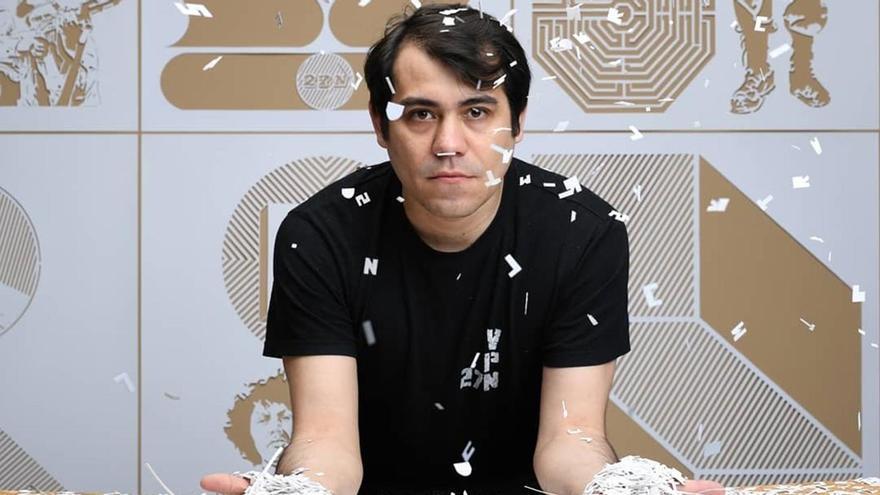
![]() 14ymedio / EFE, Havana, August 25, 2021 — Lavastida “is not feeling well, he says he is under a lot of stress,” declared the poet Katherine Bisquet, partner of the visual artist. “I just spoke with Hamlet’s mother and she has requested psychological treatment.”
14ymedio / EFE, Havana, August 25, 2021 — Lavastida “is not feeling well, he says he is under a lot of stress,” declared the poet Katherine Bisquet, partner of the visual artist. “I just spoke with Hamlet’s mother and she has requested psychological treatment.”
Bisquet said that “days ago Hamlet had asked his mother to send him pain relievers for his migraine attacks.”
Lavastida, declared a prisoner of conscience by Amnesty International, has now served 60 days in the maximum security prison in Havana known as Villa Marista, under the accusation of “instigation to commit a crime.” The artist has been denied a change of conditions of release and three appeals, Bisquet reported.
Given this, she held the Cuban regime responsible for any “physical or mental” damage that could occur to the graduate of the Higher Institute of Art: “What they do is totally illegal, typical of corrupt and despotic systems. Freedom for Hamlet Lavastida now!” she posted.
The 38-year-old artist has been in custody since June 26. State Security has made it known that he is being investigated for a conversation in a private chat in the Telegram app of the opposition group of artists 27N (27th November), in which he proposed marking bank notes with logos of the San Isidro Group and 27N, an initiative that never materialized.
Known for his critical works, the Cuban Government considers that Lavastida “has been inciting and calling for civil disobedience actions on public roads, using social networks and direct influence on others,” according to the official website, Razones de Cuba.
Article 202.1 of the Cuban Criminal Code prescribes a penalty of “deprivation of liberty from three months to one year or a fine of 100 to 300 dollars” for instigation to commit a crime, which it defines as “publicly inciting commission of a crime.”
On this subject Bisquet warned: “The expression of an idea in private, even if it foreshadows the possible commission of a crime, cannot be sanctioned if it does not materialize. In criminal law that is called a preparatory act. As a general rule, preparatory acts are not punishable.”
Lavastida returned to the Island on June 20, after completing a residency at the Künstlerhaus Bethanien art gallery in Berlin and was arrested six days later. Upon learning of the artist’s situation, the German cultural institution spoke out and described him as a “recognized visual artist” and demanded that the Cuban authorities “immediately annul his imprisonment.”
For months activists and human rights organizations have denounced an increase in the repression of dissidents, especially those linked to the world of art and entertainment, whom they claim are routinely subjected to arrests, jailings, and confinements under house arrest.
This past July, the call for Lavastida’s release reached the Arco art fair in Madrid, where the collective performance The ticketing burning the street was held, an action that Lavastida proposed to do in Cuba, but which never took place.
Those demands have been joined by international entities and institutions that have denounced the situation or expressed concern, including Amnesty International, Human Rights Watch, the United States Government, and the European Parliament.
The Cuban government, for its part, considers critical voices as agents in the pay of the United States, who seek to subvert public order and overthrow the socialist system.
Translated by Tomás A.
____________
COLLABORATE WITH OUR WORK: The 14ymedio team is committed to practicing serious journalism that reflects Cuba’s reality in all its depth. Thank you for joining us on this long journey. We invite you to continue supporting us by becoming a member of 14ymedio now. Together we can continue transforming journalism in Cuba.
